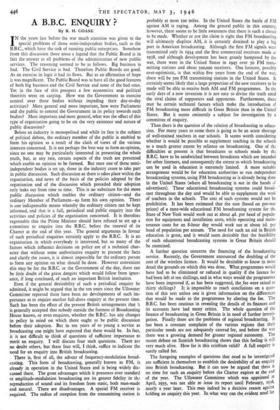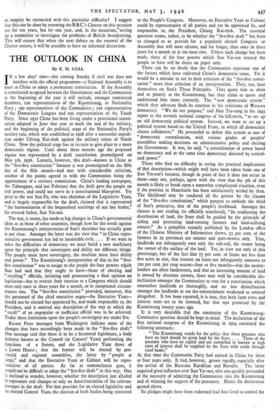A B.B.C. ENQUIRY ?
By R. H. COASE
IN the years just before the war much attention was given to the special problems of those semi-independent bodies, such as the B.B.C., which have the task of running public enterprises. Somehow from this discussion there arose a legend that the Public Board is in fict the answer to all problems of the administration of new public services. The reasoning seemed to be as follows. Big business is bad. The Civil Service is bad. Therefore Public Boards are good. As an exercise in logic it had its flaws. But as an affirmation of hope it was magnificent. The Public Board was to have all the good features of both big business and the Civil Service and none of the bad ones. Yet in the face of this prospect a few economists and political theorists went on carping. How was the Government to exercise control over these bodies without impeding their day-to-day activities? More general and more important, how were Parliament and the public to control the Government in its policy towards such bodies? Most important and most general, what was the effect of this type of organisation going to be on the very existence .and nature of public discussion?
Before an industry is monopolised and while its fate is the subject of political debate, the ordinary member of the public is enabled to form his opinion as a result of the clash of views of the various interests concerned. It is not perhaps the best way to form an opinion, since no one may be particularly interested in presenting the whole truth, but, at any rate, certain aspects of the truth are presented which enable an opinion to be formed. But once one of these semi- independent. bodies is set up, those in the industry cease to take part in public discussion. Such discussion as there is takes place within the organisation, and news of the basis of the policies adopted by the organisation and of the discussion which preceded their adoption only leaks out from time to time. This is no substitute for the more public discussion which enables the ordinary citizen—and the ordinary Member of Parliament—to form his own opinion. There is one indispensable means whereby the ordinary citizen can be kept informed, and that is a full, periodical and public enquiry into the activities and policies of the organisation concerned. It is therefore regrettable that the Prime Minister should have refused to set up a committee to enquire into the B.B.C. before the renewal of its Charter at the end of this year. The general arguments in favour of such periodical enquiries certainly apply to the B.B.C. It is an organisation in which everybody is interested, but so many of the factors which influence decisions on policy are of a technical char- acter that without some authoritative enquiry to present the facts and clarify the issues, it is almost impossible for the ordinary person to form any opinion on what should be done. However convenient this may be for the B.B.C. or the Government of the day, there can be little doubt of the grave dangers which would follow from ignor- ance, if long continued, of such an important British institution.
Even if the general desirability of such a periodical enquiry be admitted, it might be argued that in the ten years since the Ullswater Committee reported there have been no developments of such im- portance as to require another full-dress enquiry at the present time. Such has been the effect of the present British arrangements that it is generally accepted that nobody outside the fastness of Broadcasting House knows, or even enquires, whether the B.B.C. has any changes in policy in mind on which there ought to be public discussion before their adoption. But in ten years of so young a service as broadcasting one might have expected that there would be. In fact, it is not difficult to think of questions of sufficient importance to merit an enquiry. I will discuss four such questions. There are no doubt others, but these four will, I think, suffice to indicate the need for an enquiry into British broadcasting.
There is, first of all, the advent of frequency-modulation broad- casting. This form of broadcasting, generally known as FM, is already in operation in the United States and is being widely dis- cussed there. The great advantages which it possesses over standard • sunplitude-modulation broadcasting are its greater fidelity in the
reproduction of sound. and its freedom from static, both man-made and natural. There are disadvantages, A special FM receiver is required. The radius of reception from the transmitting station is probably at most too miles. In the United States the battle of FM against AM is raging. Among the general public, in this country, however, there seems to be little awareness that there is such a choice to be made. Whether or not the claim is right that FM broadcasting will ultimately displace AM, it is certainly destined to play a big part in American broadcasting. Although the first FM signals were transmitted only in 1934 and the first commercial receivers made in 1938, and although development has been greatly hampered by the war, there were in the United States in 1945 over 5o FM trans- mitting stations and about 50o,000 receivers. One forecast, possibly over-optimistic, is that within five years from the end of the war, there will be spo FM transmitting stations in the United States. It certainly seems likely that a large proportion of the new receivers to be made will-be able to receive both AM and FM programmes. In the early days of a new invention it is not easy to divine the truth amid the rival claims of supporters and opponents. Furthermore, there may be certain technical factors which make the introduction of FM broadcasting more difficult in Great Britain than in the United States. But it seems eminently a subject for investigation by a committee of enquiry.
Then there is the question of the relation of broadcasting to educa- tion. For many years to come there is going to be an acute shortage of well-trained teachers in our schools. It seems worth considering whether it would be possible to supplement teaching in the schools to a much greater extent by reliance on broadcasting. One of the difficulties at present is that broadcasts to schools made by the B.B.C. have to be sandwiched between broadcasts which are intended for other listeners, and consequently the extent to which broadcasting can be used in education is extremely limited. A more suitable arrangement would be for education authorities to run independent broadcasting systems, using FM broadcasting as is already being done in the United States (where all broadcasting is not in the hands of advertisers). These educational broadcasting systems could, broad- cast throughout the day and would be able to supplement the work of teachers in the schools. The cost of such systems would not be prohibitive. It has been estimated that the cost (based on pre-wat prices) of a state-wide educational FM broadcasting system for the State of New York would work out at about 4d. per head of popula- tion for equipment and installation costs, while operating and main- tenance costs for an 8-hour day would work out at about 2d. per head of population per annum. The need for such an aid in British education is great, and it would seem desirable that the feasibility of such educational broadcasting systems in Great Britain should be examined.
A further question concerns the financing of the broadcasting service. Recently, the Government announced the doubling of the cost of the wireless licence.. It would be desirable to know in more detail the grounds on which this was done. What programmes would have had to be eliminated or reduced in quality if the licence fee had been left at ten shillings, and in what ways would the programmes have been improved if, as has been suggested, the fee were raised to thirty shillings? It is impossible to reach conclusions on a ques- tion of this sort unless one is given information on the differences that would be made to the programmes by altering the fee. The B.B.C. has been cautious in revealing the details of its finances and its accounts have had many critics. The whole question of the finance of broadcasting in Great Britain is in need of further investi- gation. Finally there are the problems of regional broadcasting. It has been a constant complaint of the various regions that their particular needs are not adequately catered for, and before' the war there was a growing demand for greater regional autonomy. The recent debate on Scottish broadcasting shows that this feeling is still very much alive. How far is this crititism valid? A full enquiry is surely called for.
The foregoing examples of questions that need to be investigated are sufficient in themselves to establish the desirability of an enquiry into British broadcasting. But it can now be argued that there is no time for such an enquiry before the Charter expires at the end of the year. The Ullswater Committee which was appointed in April, 1935, was, not able to issue its report until February, 1936, . nearly a year later. This may indeed be a decisive reason against holding an enquiry this year. In what way can the evident need for
an enquiry be reconciled with this particular difficulty? I suggest that this can be done by renewing the B.B.C.'s Charter on this occasion not for ten years, but for one year, and, in the meantime:setting up a committee to investigate the problems of British broadcasting.
This will ensure that when the next debate on the renewal of the Charter occurs, it will be possible to have an informed discussion.































 Previous page
Previous page